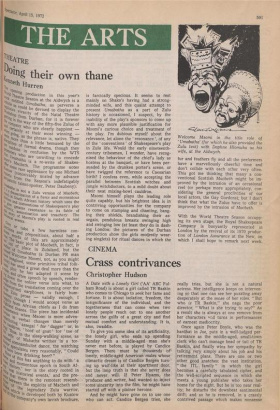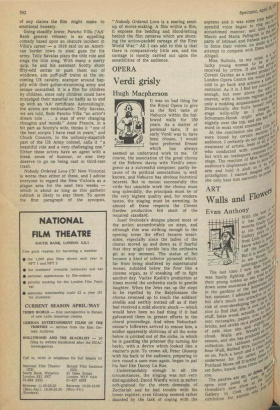CINEMA
Crass contrivances
Christopher Hudson A Date with a Lonely Girl ('AA' ABC Fulham Road) is about a girl called TR Baskin who comes to Chicago to seek her fame and fortune. It is about isolation, freedom, the insignificance of the individual, and the togetherness that can come when two lonely people reach out to one another across the gulfs of a great city and find mutual comfort and understanding. It is, also, twaddle.
To give you some idea of its artificiality, the lonely girl, who ends up spending Sunday with a middle-aged man she's never met before, is played by Candice Bergen. There must be thousands of lonely, middle-aged American males whose climactic dream is of Candice Bergen turning up waif-like at their apartment door, but the limp truth is that she never does and never will. If Peter Hyams, the producer and writer, had wanted to inject some sincerity into the film, he might have started off with a plainer heroine. And he might have gone on to use one who can act. Candice Bergen tries, she really tries, but she is not a natural actress. Her intelligence keeps on intervening so that one can see her puzzling away desperately at the sense of her roles. "But who is TR Baskin," she nags the poor director, "What is she trying to say?" As a result she is always at one remove from her characters gr.d turns in performances of earnest mediocrity. Once again Peter Boyle, who was the hardhat in Joe, puts in a well-judged performance as the middle-aged, small-town clerk who can't manage head or tail of TR Baskin, and finally wins her sympathy by talking very simply about his job and his retirement plans. There are one or two other good snatches: the vast institution, "the ITL family" in which the girl becomes a carefully tabulated cipher, and the well-scripted sequence in which she meets a young publisher who takes her home for the night. But he is too near reality; he disturbs the downbeat sentimental drift: and so he is removed, in a crassly Contrived passage which makes nonsense
of any claims the film might make to emotional honesty.
Going steadily lower, Pancho Villa (AA' Rank general release) is an appalling comedy based upon an obscure incident in Villa's career — a 1916 raid on an American border town to steal guns for his army. Telly Savalas plays the title role and sings the title song. With many a merry quip, he and his assistant Scotty shoot fifty-odd extras or push them out of windows, aim puff-puff trains at the oncoming US cavalry, scamper around happily with their guitar-strumming army and escape unscathed. It is a film for children by children, since only children could have misjudged their material so badly as to end up with an `AA' certificate. Astonishingly, the actors are enthusiastic. Telly Savalas, we are told, finds Pancho Villa "an actor's dream role . . . a man of ever changing thoughts and moods." Anne Francis, in a bit part as Scotty's wife, thinks it " one of the best scripts I have read in years," and Chuck Connors, in the unfunny-slapstick part of the US Army colonel, calls it "a beautiful role and a very challenging one." Either these actors have an agent with a bleak sense of humour, or else they deserve to go on being cast in third-rate trash.
Nobody Ordered Love ('X' New Victoria) is worse than either of these, and I advise everyone to regard the New Victoria as a plague area for the next two weeks — which is about as long as this pathetic rubbish is likely to stay there. To quote the first paragraph of the synopsis,
"Nobody Ordered Love is a searing sendup of movie-making. A film within a film, it exposes the bedding and blood-letting behind the film cameras which are shooting the action-packed carnage of the First World War." All I can add to this is that there is comparatively little sex, and the carnage is mostly carried out upon the sensibilities of the audience.



































 Previous page
Previous page